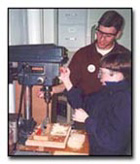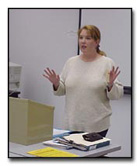| This course provides an initial introduction to the technology education curriculum from grades K-12, with an emphasis on the middle school level. Students combine theory and practice in technology education as they begin to develop technology education curriculum materials and explore various approaches for delivering technology education in a variety of settings. Course Goals
Students will: -
Examine the Virginia technology education curriculum and National technology content standards for grades K-12 and apply these guidelines to the development of new curriculum materials in technology education. -
Analyze and use appropriate teaching and learning strategies to effectively convey technological concepts in a meaningful and interesting manner, including the use of instructional technologies. -
Design, implement, and/or evaluate appropriate technology education learning activities and resources for the elementary, middle, and secondary levels. -
Develop a basic understanding of general teaching strategies, classroom management techniques, and evaluation procedures used in technology education. -
Discuss teaching and learning methods appropriate for exceptional students enrolled in technology education courses, including gifted and talented and those with disabling conditions. -
Safely and efficiently use tools, materials, processes, and systems to solve technological problems and to create useful teaching-learning activities and media for technology education teaching and learning.
Learning Experiences Design Brief Development
Students create at least two comprehensive design briefs (technological problem-solving activities) for the middle school level. The design briefs must support the national Standards for Technological Literacy, the Virginia middle school technology education curriculum, and the Virginia Standards of Learning. Design briefs include objectives, project guidelines, evaluation suggestions, materials lists, references or resources, and more. One of the design briefs must be accompanied by a sample solution made with the tools and materials specified in the design brief. Technology Learning Center
Students develop a three-dimensional student learning center that focuses on a specific technological concept or idea. The learning center must be developmentally appropriate and educationally sound. Students are expected to apply their production and communication skills to the development of a well-constructed and aesthetically pleasing product. All peers (and the instructor) evaluate the learning centers. Lesson Presentation
Students plan and conduct a short lesson related to a specific technological topic of their choice. Students develop the detailed lesson plan and prepare all materials related to the lesson, including instructional media. The lesson is delivered to the entire class and it is videotaped. All peers (and the instructor) evaluate the lesson. The lesson presenter reviews his/her videotape and writes a self-evaluation. Book Review
Students locate a textbook that would be appropriate for middle school technology education. The book is then reviewed and critiqued according to established criteria. Youth Technology Day is a meaningful and fun technology program for young people. It provides an opportunity for young people (Girl Scouts, Boy Scouts, or other similar groups) to visit Virginia Tech’s technology education program and laboratories and to participate in challenging technology activities that are planned and directed by the students in this class. The 2-3 hour event, which is planned and implemented in its entirety by the Practicum class, involves young people in various activities that: -
Are well organized and developmentally appropriate for the participants, -
Are highly experiential, conceptually rich, and pedagogically sound, -
Broaden participants’ technological understanding and appreciation, and -
Serve to improve participants’ awareness of technology education and the role of technology in their lives. Practicum students plan the program (which must be supported by technology education objectives), handle all communications related to the event (including communications with the media), take care of all purchasing of materials and supplies (including solicitation of donations when necessary), and document the event with a portfolio. Other Class Projects and Assignments There are several other small class projects and assignments. Short problem-solving projects and assignments are assigned periodically to promote or initiate discussion about how technological activities are chosen, designed, and organized. We visit a modular technology education laboratory and meet with a practicing teacher to discuss this type of facility. In addition, students read technology education case studies and engage in a meaningful discussion/debate about the situation and facility described. Peer evaluations of some projects enables us to discuss assessment and talk about evaluation of students.
TE Home |


